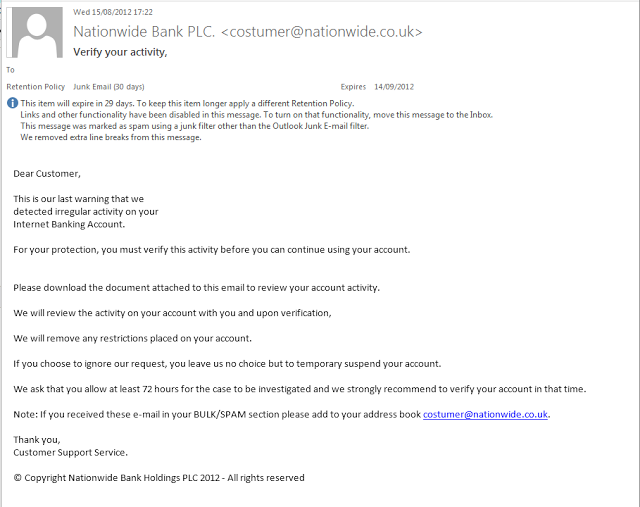Whist looking through my Junk folder in outlook I found this.\
\
[](https://res.cloudinary.com/gregpakes/image/upload/v1439623901/pelabvluh4cblg68ic8o.png)
\
For a brief moment, it caught my attention. But it soon fails the
simplest of read through's. Below is a non-exhaustive list of the
mistakes:
\
- From address is "costumer@..."
- Formatting of the first paragraph is terrible.
- The 4th paragraph ends in a comma rather than a full stop.
- 6th paragraph uses the word "temporary" rather than "temporarily".
- 7th Paragraph doesn't even make sense.
- Email address in the 8th paragraph is "costumer"
\
I'm sure there are other irregularities, these are just the ones I
managed to spot at a glance.
\
What if the spelling and grammar is correct?
Lets assume that I do bank with Nationwide PLC. I still don't think I
would have been fooled. For the following reasons:
\
- Why would they be emailing me about irregularities? Experience
shows me that fraud is tackled with a phone call or a letter.
- Why would they send an attachment with my recent account history?
No self respecting bank would send account history to "costumers"
via email.
\
I think the golden rule is to avoid attachments and links in any email
you are not sure of. If in doubt, open your browser and go direct to
the site and login. Any issue that they contact you about over email,
would be reflected through your account page on their website.
\
Scott Hanselman has a great article on this topic which can be found
[here](http://www.hanselman.com/blog/IfMalwareAuthorsEverLearnHowToSpellWereAllScrewedTheComingHTML5MalwareApocalypse.aspx).